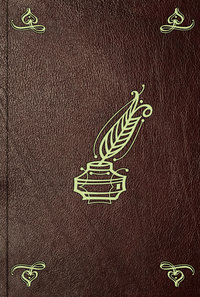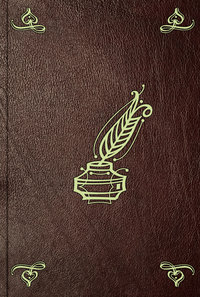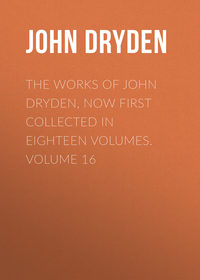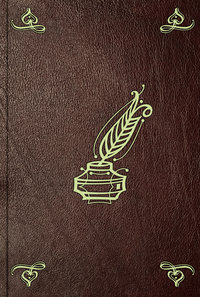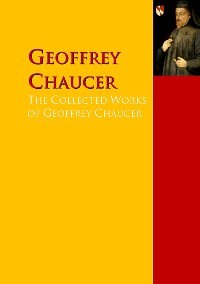The Works of John Dryden, now first collected in eighteen volumes. Volume 12
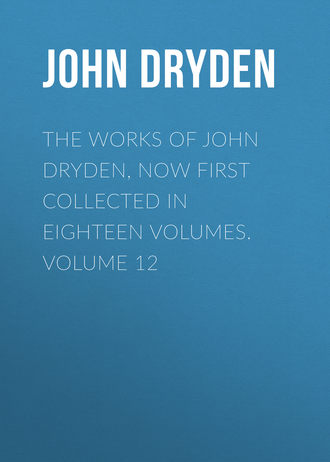 полная версия
полная версияThe Works of John Dryden, now first collected in eighteen volumes. Volume 12
Настройки чтения
Размер шрифта
Высота строк
Поля

John Dryden
The Works of John Dryden, Now First Collected in Eighteen Volumes; Vol. 12 (of 18)
APPENDIX TO THE FABLES
This Appendix contains the Original Tales of Chaucer, which Dryden has modernized. The Novels of Boccacio are subjoined to the several Poetical English Versions.
THE KNIGHTES TALE,
BY GEOFFREY CHAUCERWhilom, as old stories tellen us,There was a duk that highte Theseus;Of Athenes he was lord and governour,And in his time swiche a conquerour,That greter was ther non under the sonne;Ful many a riche contree had he wonne.What with his wisdom and his chevalrie,He conquerd all the regne of Feminie,That whilom was ycleped Scythia,And wedded the fresshe Quene Ipolita,And brought hire home with him to his contreeWith mochel glorie and solempnitee,And eke hire yonge suster Emelie.And thus with victorie and with melodieLet I this worthy duk to Athenes ride,And all his host in armes him beside.And certes, if it n'ere to long to here,I wolde have told you fully the manereHow wonnen was the regne of FeminieBy Theseus, and by his chevalrie:And of the grete bataille for the nonesBetwix Athenes and Amasones:And how asseged was Ipolita,The faire hardie quene of Scythia;And of the feste, that was at hire wedding,And of the temple at hire home coming:But all this thing I moste as now forbere;I have, God wot, a large feld to ere,And weke ben the oxen in my plowe:The remenent of my tale is long ynow.I wil not letten eke non of this route;Let every felaw telle his tale aboute,And let se now who shal the souper winne,There as I left, I will agen beginne.This duk, of whom I made mentioun,Whan he was comen almost to the toun,In all his wele and his moste pride,He was ware, as he cast his eye aside,Wher that ther kneled in the highe weyA compagnie of ladies, twey and twey,Eche after other, clad in clothes blake;But swiche a crie and swiche a wo they make,That in this world n'is creature livingThat ever heard swiche another waimenting;And of this crie ne wolde never stenten,Till they the reines of his bridel henten.What folk be ye that at min home comingPerturben so my feste with crying?Quod Theseus; have ye so grete envieOf min honour, that thus complaine and crie?Or who hath you misboden, or offended?Do telle me, if that it may be amended,And why ye be thus clothed all in blake?The oldest lady of hem all than spake,Whan she had swouned with a dedly chere,That it was reuthe for to seen and here.She sayde, Lord, to whom Fortune hath yevenVictorie, and as a conqueror to liven,Nought greveth us your glorie and your honour,But we beseke you of mercie and socour:Have mercie on our wo and our distresse:Some drope of pitee thrugh thy gentillesseUpon us wretched wimmen let now fall;For certes, lord, there n'is non of us alleThat she n'hath ben a duchesse or a quene;Now be we caitives, as it is wel sene:Thanked be Fortune, and hire false whele,That non estat ensureth to be wele.And certes, lord, to abiden your presence,Here in this temple of the goddesse Clemence,We han ben waiting all this fourtenight:Now help us, lord, sin it lieth in thy might.I wretched wight, that wepe and waile thus,Was whilom wif to King Capaneus,That starfe at Thebes, cursed be that day,And alle we that ben in this aray,And maken all this lamentation,We losten all our husbondes at that toun,While that the siege therabouten lay:And yet now the old Creon, wala wa!That lord is now of Thebes the citee,Fulfilled of ire and of iniquittee,He for despit, and for his tyrannie,To don the ded bodies a vilanie,Of alle our lordes, which that ben yslawe,Hath alle the bodies on an hepe ydrawe,And will not suffren hem by non assentNeyther to ben yberied, ne ybrent,But maketh houndes ete hem in despite.And with that word, withouten more respite,They fallen groff, and crien pitously,Have on us wretched wimmen som mercy,And let our sorwe sinken in thin herte.This gentil duk doun from his courser sterte,With herte piteous, whan he herd hem speke.Him thoughte that his herte wold all to-brekeWhen he saw hem so pitous and so mateThat whilom weren of so gret estate,And in his armes, he hem all up hente,And hem comforted in ful good entente,And swore his oth, as he was trewe knight,He wolde don so ferforthly his mightUpon the tyrant Creon hem to wreke,That all the peple of Grece shulde spekeHow Creon was of Theseus yserved;As he that hath his deth ful wel deserved.And right anon, withouten more abode,His banner he displaide, and forth he rodeTo Thebes ward, and all his host beside:No ner Athenes n'olde he go ne ride,Ne take his ese fully half a day,But onward on his way that night he lay,And sent anon Ipolita the queneAnd Emeli hire yonge sister shene,Unto the toun of Athenes for to dwell;And forth he rit; ther n'is no more to tell.The red statue of Mars, with spere and targe,So shineth in his white banner large,That all the feldes gliteren up and doun;And by his banner borne is his penoun,Of golde ful riche, in which ther was ybeteThe Minotaure, which that he slew in Crete.Thus rit this duk, thus rit this conquerour,And in his host of chevalrie the flour,Til that he came to Thebes, and alightFayre in a felde, ther as he thought to fight:But shortly for to speken of this thing,With Creon, which that was of Thebes king,He fought and slew him manly as a knightIn plaine bataille, and put his folk to flight;And by assaut he wan the citee after,And rent adoun bothe wall, and sparre, and rafter;And to the ladies he restored againThe bodies of hir housbondes that were slain,To don the obsequies, as was tho the gise.But it were all to long for to deviseThe grete clamour and the waimentingWhiche that the ladies made at the brenningOf the bodies, and the gret honourThat Theseus, the noble conquerour,Doth to the ladies whan they from him wente;But shortly for to telle is min entente.Whan that this worthy duk, this Theseus,Hath Creon slain, and wonnen Thebes thus,Still in the feld he toke all night his reste,And did with all the countree as hem leste;To ransake in the tas of bodies dede,Hem for to stripe of harneis and of wede,The pillours dide hir businesse and cure,After the bataille and discomfiture;And so befell, that, in the tas, they found,Thurgh girt with many a grevous blody wound,Two yonge knightes ligging by and by,Bothe in on armes, wrought ful richely;Of whiche two, Arcite highte that on.And he that other highte Palamon.Not fully quik, ne fully ded they were,But by hir cote armure, and by hir gere,The heraudes knew hem wel in special,As tho that weren of the blod realOf Thebes, and of sustren two yborne:Out of the tas the pillours han hem torne,And han hem carried soft unto the tenteOf Theseus, and he ful sone hem senteTo Athenes, for to dwellen in prisonPerpetuel, he n'olde no raunson.And whan this worthy duk had thus ydon,He toke his host, and home he rit anon,With laurel crouned as a conquerour;And ther he liveth in joye and in honour,Terme of his lif; what nedeth wordes mo?And in a tour, in anguish and in wo,Dwellen this Palamon, and eke Arcite,For evermo, ther may no gold hem quite.Thus passeth yere by yere, and day by day,Till it fell ones, in a morwe of May,That Emilie, that fayrer was to seneThan is the lilie upon the stalke grene,And fressher than the May with floures new,(For with the rose colour strof hire hewe,I n'ot which was the finer of hem two,)Er it was day, as she was wont to do,She was arisen, and all redy dight;For May wol have no slogardie a-night:The season priketh every gentil herte,And maketh him out of his slepe to sterte,And sayth, Arise, and do thin observance.This maketh Emelie han remembraunceTo don honour to May, and for to rise;Yclothed was she fresshe for to devise;Hire yelwe here was broided in a tresseBehind hire back, a yerde long I gesse;And in the gardin at sonne uprist,She walketh up and doun wher as hire list;She gathereth floures, partie white and red,To make a sotel garland for hire hed;And as an angel hevenlich she song:The grete tour that was so thikke and strong,Which, of the castel, was the chef dongeon(Wher as these knightes weren in prison,Of which I tolde you, and tellen shal,)Was even joinant to the gardin wall,Ther as this Emelie had hire playing.Bright was the sonne, and clere that morwening,And Palamon, this woful prisoner,As was his wone, by leve of his gayler,Was risen, and romed in a chambre on high,In which he all the noble citee seigh,And eke the gardin ful of brandies grene,Ther as this fresshe Emelie the sheneWas in hire walk, and romed up and doun.This sorweful prisoner, this Palamon,Goth in his chambre roming to and fro,And to himselfe complaining of his wo:That he was borne, ful oft he sayd, Alas!And so befel, by aventure, or cas,That thrugh a window thikke of many a barreOf yren gret, and square as any sparre,He cast his eyen upon Emilia,And therwithal he blent, and cried, A!As though he stongen were unto the herte.And with that crie Arcite anon up sterte,And saide, Cosin min, what eyleth thee,That art so pale and dedly for to see?Why cridest thou? who hath thee don offence?For Goddes love, take all in patienceOur prison, for it may non other be,Fortune hath yeven us this adversite:Som wikke aspect or dispositionOf Saturne, by som constellation,Hath yeven us this, although we had it sworn:So stood the heven, when that we were born;We moste endure; this is the short and plain.This Palamon answerde, and sayde again,Cosin, forsoth of this opinionThou hast a vaine imagination;This prison caused me not to crie,But I was hurt right now thurghout min eyeInto min herte, that wol my bane be.The fayrenesse of a lady that I seYond in the gardin, roming to and fro,Is cause of all my crying and wo:I n'ot whe'r she be woman or goddesse,But Venus is it, sothly, as I gesse.And therwithall on knees adoun he fill,And sayde, Venus, if it be your willYou in this gardin thus to transfigure,Beforn me sorweful wretched creature,Out of this prison helpe that we may scape,And if so be our destine be shapeBy eterne word, to dien in prison,Of our lignage have som compassion,That is so low ybrought by tyrannie.And with that word Arcita gan espieWher as this lady romed to and fro,And with that sight hire beaute hurt him so,That if that Palamon was wounded sore,Arcite is hurt as moche as he, or more:And with a sigh he sayde pitously,The fresshe bentee sleth me sodenly,Of hire that rometh in yonder place.And but I have hire mercie and hire grace,That I may seen hire at the leste way,I n'am but ded, there n'is no more to say.This Palamon, whan he these wordes herd,Dispitously he loked, and answerd,Whether sayest thou this in ernest or in play?Nay, quod Arcite, in ernest be my fay;God helpe me so, me lust full yvel play.This Palamon gan knit his browes twey:It were, quod he, to thee no gret honourFor to be false, ne for to be traytourTo me, that am thy cosin and thy brother:Ysworne ful depe, and eche of us to other,That neuer for to dien in the peine,Till that the deth departen shal us tweine,Neyther of us in love to hindre other,Ne in non other cas, my leve brother;But that thou shuldest trewely forther meIn evry cas, as I shuld forther thee.This was thin oth, and min also certain,I wot it wel thou darst it not withsain:Thus art thou of my conseil out of doute,And now thou woldest falsly ben abouteTo love my lady, whom I love and serve,And ever shal, til that min herte sterve.Now certes, false Arcite, thou shalt not so;I loved hire firste, and tolde thee my wo,As to my conseil, and to my brother sworneTo forther me, as I have tolde beforne,For which thou art ybounden as a knightTo helpen me, if it lie in thy might;Or elles art thou false, I dare wel sain.This Arcita full proudly spake again:Thou shalt, quod he, be rather false than I,And thou art false, I tell thee utterly.For par amour I loved hire first, or thou.What wolt thou sayn, thou wistest nat right nowWhether she were a woman or a goddesse:Thin is affection of holinesse,And min is love as to a creature,For which I tolde thee min aventure,As to my cosin, and my brother sworne.I pose, that thou lovedst hire beforne:Wost thou not wel the olde clerkes sawe,That who shall give a lover any lawe?Love is a greter lawe, by my pan,Than may be yeven of any erthly man;And therfore positif lawe, and swiche decreeIs broken all day for love in eche degree.A man moste nedes love, maugre his hed;He may nat fleen it though he shuld be ded,All be she maid, or widewe, or elles wif.And eke it is not likely all thy lifTo stonden in hire grace, no more shal I;For well thou wost thyselven veraily,That thou and I be damned to prisonPerpetuel, us gaineth no raunson.We strive, as did the houndes for the bone,They fought all day, and yet hir part was none:Ther came a kyte, while that they were so wrothe,And bare away the bone betwix hem bothe:And, therfore, at kinges court, my brother,Eche man for himself, ther is non other.Love if thee lust, for I love, and ay shal;And sothly, leve brother, this is al.Here in this prison mosten we endure,And everich of us take his aventure.Great was the strif, and long, betwix hem twey,If that I hadde leiser for to sey;But to the effect. It happed on a day,(To tell it you as shortly as I may,)A worthy duk that highte Perithous,That felaw was to this duk TheseusSin thilke day that they were children lite,Was come to Athenes, his felaw to visite,And for to play, as he was wont to do,For in this world he loved no man so;And he loved him as tenderly again:So well they loved, as old bokes sain,That whan that on was ded, sothly to tell,His felaw wente and sought him doun in hell;But of that storie list me not to write.Duk Perithous loved wel Arcite,And had him knowe at Thebes yere by yere,And finally, at request and praiereOf Perithous, withouten any raunson,Duk Theseus let him out of prison,Frely to gon wher that him list over all,In swiche a gise as I you tellen shall.This was the forword, plainly for to endite,Betwixen Theseus and him Arcite:That if so were, that Arcite were yfoundEver in his lif, by day or night, o stoundIn any countree of this Theseus,And he were caught, it was accorded thus,That with a swerd he shulde lese his hed;Ther was non other remedie, ne rede.But taketh his leve, and homeward he him speede:Let him beware, his nekke lieth to wedde.How great a sorwe suffereth now Arcite?The deth he feleth thurgh his herte smite:He wepeth, waileth, crieth pitously,To sleen himself he waiteth prively.He said, Alas the day that I was borne!Now is my prison werse than beforne;Now is me shape eternally to dwelleNot only in purgatorie, but in helle.Alas! that ever I knew Perithous,For elles had I dwelt with Theseus,Yfetered in his prison evermo,Than had I ben in blisse, and not in wo:Only the sight of hire, whom that I serve,Though that I never hire grace may deserve,Wold have sufficed right ynough for me.O dere cosin Palamon, quod he,Thin is the victorie of this aventure;Ful blisful in prison maiest thou endure:In prison! certes nay, but in paradise.Wel hath Fortune yturned thee the dise,That hast the sight of hire, and I the absence.For possible is, sin thou hast hire presence,And art a knight, a worthy and an able,That by some cas, sin Fortune is changeable,Thou maiest to thy desir somtime atteine:But I that am exiled, and barreineOf alle grace, and in so gret despaire,That ther n'is erthe, water, fire, ne aire,Ne creature, that of hem maked is,That may me hele or don comfort in this,Wel ought I sterve in wanhope and distresse.Farewel my lif, my lust, and my gladnesse.Alas! why plainen men so in communeOf purveiance of God, or of Fortune,That yeveth hem ful oft in many a gise,Wel better than they can hemself devise;Som man desireth for to have richesse,That cause is of his murdre or gret siknesse;And som man wold out of his prison fayne,That in his house is of his meinie slain.Infinite harmes ben in this matere,We wote not what thing that we praien here.We saren as he that dronke is as a mous:A dronken man wot wel he hath an hous,But he ne wot which the right way thider,And to a dronken man the way is slider.And certes in this world so faren we;We seken fast after felicite,But we go wrong ful often trewely.Thus we may sayen alle, and namely I,That wende, and had a gret opinion,That if I might escapen fro prison,Than I had ben in joye and parfite hele,Ther now I am exiled fro my wele.Sin that I may not seen you, Emelie,I n'am but ded; there n'is no remedie.Upon that other side Palamon,Whan that he wist Arcita was agon,Swiche sorwe he maketh, that the grete tourResouned of his yelling and clamour.The pure fetters on his shinnes greteWere of his bitter salte teres wete.Alas! quod he, Arcita, cosin min,Of all our strif, God wot, the frute is thin.Thou walkest now in Thebes at thy large,And of my wo, thou yevest litel charge.Thou maist, sith thou hast wisdom and manhede,Assemblen all the folk of our kinrede,And make werre so sharpe in this contree,That by som aventure, or som tretee,Thou maist have hire to lady and to wif,For whom that I must nedes lese my lif.For, as by way of possibilitee,Sith thou art at thy large of prison free,And art a lord, gret is thine avantage,More than is min, that sterve her in a cage;For I may wepe and waile, while that I live,With all the wo that prison may me yeve,And eke with peine that love me yeveth also,That doubleth all my tourment and my wo.Therwith the fire of jalousie up sterteWithin his brest, and hent him by the herteSo woodly, that he like was to beholdThe boxe-tree, or the ashen, ded and cold.Than said he: O cruel goddes, that governeThis world with binding of your word eterne,And writen in the table of athamant,Your parlement, and your eterne grant,What is mankind more unto yholdThan is the shepe, that rouketh in the fold?For slain is man, right as another beest,And dwelleth eke in prison, and arrest,And hath siknesse, and gret adversite,And often times gilteles parde.What governance is in this prescience,That gilteless turmenteth innocence?And yet encreseth this all my penance,That man is bounden to his observance,For Goddes sake to leten of his will,Ther as a beest may all his lust fulfill:And when a beest is ded, he hath no peine;But man, after his deth, mote wepe and pleine,Though in this world he have care and wo,Withouten doute it maye stonden so.The answer of this lete I to divines,But wel I wote, that in this world gret pine is.Alas! I see a serpent or a thefe,That many a trewe man hath do meschefe,Gon at his large, and wher him lust may turn.But I moste ben in prison thurgh Saturn,And eke thurgh Juno, jalous and eke wood,That hath wel neye destruied all the bloodOf Thebes, with his waste walles wide;And Venus sleeth me on that other side,For jalousie, and fere of him, Arcite.Now wol I stent of Palamon a lite,And leten him in his prison still dwelle,And of Arcita forth I wol you telle.The sommer passeth, and the nightes long,Encresen double wise the peines strongBoth of the lover and of the prisoner;I n'ot which hath the wofuller mistere:For, shortly for to say, this PalamonPerpetuelly is damned to prison,In chaines and in fetters to ben ded;And Arcite is exiled on his hedFor evermore, as out of that contree,Ne never more he shal his lady see.You lovers, axe I now this question,Who hath the werse, Arcite, or Palamon?That on may se his lady day by day,But in prison moste he dwellen alway:That other wher him lust may ride or go,But sen his lady shal he never mo.Now demeth as you liste, ye that can,For I wil tell you forth, as I began.When that Arcite to Thebes comen was,Ful oft a day he swelt, and said, Alas!For sen his lady shal he neuer mo.And, shortly, to concluden all his wo,So mochel sorwe hadde never creatureThat is or shal be while the world may dure.His slepe, his mete, his drinke, is him byraft,That lene he wex, and drie as is a shaft.His eyen holwe, and grisly to behold,His hewe salowe, and pale as ashen cold;And solitary he was, and ever alone,And wailing all the night, making mone;And if he herde song or instrument,Than would he wepe, he mighte not be stent:So feble were his spirites, and so low,And changed so, that no man coude knowHis speche ne his vois, though men it herd.And in his gere, for all the world he ferd,Nought only like the lovers maladie,Of Ereos, but rather ylike manie,Engendred of humours melancolike,Beforne his hed in his celle fantastike.And shortly turned was all up so dounBoth habit and eke dispositiounOf him, this woful lover Dan Arcite.What shuld I all day of his wo endite?Whan he endured had a yere or twoThis cruel torment, and this peine and wo,At Thebes, in his contree, as I said,Upon a night in slepe as he him laid,Him thought how that the winged god MercuryBeforne him stood, and bad him be mery.His slepy yerde in hond he bare upright;An hat he wered upon his heres bright:Arraied was this god, (as he toke kepe,)As he was whan that Argus toke his slepe,And said him thus: To Athenes shall thou wende,Ther is thee shapen of thy wo an ende.And with that word Arcite awoke and stert.Now trewely how sore that ever me smert,Quod he, to Athenes right now wol I fare;Ne for no drede of deth shall I not spareTo se my lady, that I love and serve;In hire presence I rekke not to sterve.And with that word he caught a gret mirrour,And saw that changed was all his colour,And saw his visage all in another kind;And right anon it ran him in his mind,That sith his face was so disfiguredOf maladie, the which he had endured,He might wel, if that he bare him lowe,Live in Athenes evermore unknowe,And sen his lady wel nigh day by day.And right anon he changed his aray,And clad him as a poure labourer;And all alone (save only a squier,That knew his privitie and all his cas,Which was disguised pourely as he was,)To Athenes is he gone the nexte way.And to the court he went upon a day,And at the gate he proffered his service,To drugge and draw what so men wold devise.And shortly of this matere for to sayn,He fell in office with a chamberlain,The which that dwelling was with Emelie;For he was wise, and coude sone espieOf every servent which that served hire:Wel coud he hewen wood, and water bere,For he was yonge and mighty for the nones,And thereto he was strong and big of bonesTo done that any wight can him devise.A yere or two he was in this service,Page of the chambre of Emelie the bright,And Philostrate he sayde that he hight.But half so wel beloved man as heNe was ther never in court of his degre.He was so gentil of conditioun,That thurghout all the court was his renoun.They sayden that it were a chariteThat Theseus wold enhaunse his degre,And putten him in a worshipful service,Ther as he might his vertues exercise.And thus, within a while, his name is spronge,Both of his dedes, and of his good tonge,That Theseus had taken him so ner,That of his chambre he made him squier,And gave him gold to mainteine his degre;And eke men brought him out of his contreFro yere to yere ful prively his rent;But honestly and sleighly he it spent,That no man wondred how that he it hadde.And thre yere in this wise his lif he ladde,And bare him so in pees and eke in werre,Ther n'as no man that Theseus hath derre.And in this blisse let I now Arcite,And speke I wol of Palamon a lite.In derkenesse and horrible and strong prisonThis seven yere hath sitten Palamon,Forpined, what for love and for distresse.Who feleth double sorwe and hevinesseBut Palamon? that love distraineth so,That wood out of his wit he goth for wo,And eke therto he is a prisonerePerpetuell, not only for a yere.Who coude rime in English proprelyHis martirdom? forsoth it am not I;Therfore I passe as lightly as I may.It fel that in the seventh yere, in May,The thridde night, (as olde bokes sayn,That all this storie tellen more plain,)Were it by aventure or destinee,(As when a thing is shapen, it shal be)That sone after the midnight Palamon,By helping of a frend, brake his prison,And fleeth the cite faste as he may go,For he had yeven drinke his gayler so,Of a clarre, made of a certain wine,With narcotikes and opie of Thebes fine,That all the night, though that men wold him shake,The gailer slept, he mighte not awake;And thus he fleeth as faste as ever he may.The night was short, and faste by the day,That nedes cost he moste himselven hide,And to a grove faste ther beside,With dredful foot then stalketh Palamon,For shortly this was his opinion,That in that grove he wold him hide all day,And in the night than wold he take his wayTo Thebes ward, his frendes for to preieOn Theseus to helpen him werreie:And shortly, eyther he wold lese his lif,Or winnen Emelie unto his wif.This is the effect, and his entente plein.Now wol I turnen to Arcite agein,That litel wist how neighe was his care,Till that Fortune had brought him in the snare.The besy larke, the messager of day,Salewith in hire song the morwe gray,And firy Phebus riseth up so bright,That all the orient laugheth of the sight;And with his stremes drieth in the grevesThe silver dropes hanging in the leves.And Arcite, that is in the court realWith Theseus the squier principal,Is risen, and loketh on the mery day;And for to don his observance to May,Remembring on the point of his desire,He on his courser, sterting as the fire,Is ridden to the feldes him to pley,Out of the court, were it a mile or twey,And to the grove, of which that I you told,By aventure, his way he gan to hold,To maken him a gerlond of the greves,Were it of woodbind or of hauthorn leves,And loud he song agen the sonne shene.O Maye, with all thy floures and thy grene,Right welcome be thou, faire fresshe May,I hope that I some grene here getten may.And from his courser, with a lusty herte,Into the grove ful hastily he sterte,And in a path he romed up and doun.Ther, as by aventure this PalamonWas in a bush, that no man might him se,For sore afered of his deth was he:Nothing ne knew he that it was Arcite,God wot he wold have trowed it ful lite.But soth is said, gon sithen are many yeres,That feld hath eyen, and wood hath eres,It is ful faire a man to bere him even,For al day meten men at unset steven.Ful litel wote Arcite of his felaw,That was so neigh to herken of his saw;For in the bush he sitteth now ful still.Whan that Arcite had romed all his fill,And songen all the roundel lustily,Into a studie he fell sodenly,As don these lovers in hir queinte geres,Now in the crop, and now down in the breres;Now up, now doun, as boket in a well.Right as the Friday, sothly for to tell,Now shineth it, and now it raineth fast;Right so can gery Venus overcastThe hertes of hire folk, right as hire dayIs gerfull, right so changeth she aray;Selde is the Friday all the weke ylike.Whan Arcite hadde ysonge, he gan to sike,And set him doun withouten any more:Alas! quod he, the day that I was bore!How longe, Juno, thurgh thy crueltee,Wilt thou werreien Thebes the citee?Alas! ybrought is to confusionThe blood real of Cadme and Amphion:Of Cadmus, which that was the firste manThat Thebes built, or firste the toun began.And of the citee firste was crouned king.Of his linage am I, and his ofspringBy veray line, as of the stok real:And now I am so caitif and so thral,That he that is my mortal enemyI serve him as his squier pourely.And yet doth Juno me wel more shame;For I dare not beknowe min owen name,But ther, as I was wont to highte Arcite,Now highte I Philostrat not worth a mite:Alas! thou fell Mars; alas! thou Juno,Thus hath your ire our linage all fordo,Save only me, and wretched Palamon,That Theseus martireth in prison;And over all this, to slen me utterly,Love hath his firy dart so brenninglyYsticked thurgh my trewe careful hert,That shapen was my deth erst than my shert.Ye slen me with your eyen, Emelie;Ye ben the cause wherfore that I die.Of all the remenant of min other careNe set I not the mountance of a tare,So that I coud don ought to your plesance.And with that word he fell doun in a tranceA longe time, and afterward up sterte.This Palamon that thought thurghout his herteHe felt a colde swerd sodenly glide,For ire he quoke, no lenger wolde he hide:And whan that he had herd Arcites tale,As he were wood, with face ded and pale,He sterte him up out of the bushes thikke,And sayde, False Arcite, false traitour wicke,Now art thou hent, that lovest my lady so;For whom that I have all this peine and wo,And art my blood, and to my conseil sworn,As I ful oft have told thee herebeforn:And hast bejaped here Duk Theseus,And falsely changed hast thy name thus;I wol be ded, or elles thou shalt die:Thou shalt not love my lady Emelie,But I wol love hire only and no mo,For I am Palamon, thy mortal fo.And though that I no wepen have in this place,But out of prison am astert by grace,I drede nought that eyther thou shalt die,Or thou ne shalt nat loven Emelie:Chese which thou wilt, for thou shalt not asterte.This Arcite tho, with ful dispitous herte,Whan he him knew, and had his tale herd,As fers as a leon, pulled out a swerd,And sayde thus; By God, that sitteth above,N'ere it that thou art sicke, and wood for love,And eke that thou no wepen hast in this place,Thou shuldest never out this grove pace,That thou ne shuldest dien of min hond;For I defie the suretee and the bondWhich that thou saist that I have made to thee.What! veray fool, thinke wel that love is freeAnd I wol love her maugre all thy might:But for thou art a worthy gentil knight,And wilnest to darraine hire by bataille,Have here my trouth, to morwe I will not faille,Withouten weting of any other wight,That here I wol be founden as a knight,And bringen harneis right ynough for thee,And chese the beste, and leve the werste for me:And mete and drinke this night wol I bringYnough for thee, and cloathes for thy bedding;And if so be that thou my lady win,And sle me in this wode ther I am in,Thou maist well have thy lady as for me.This Palamon answered, I grant it thee.And thus they ben departed till a morwe,When eche of hem hath laid his faith to borwe.O Cupide, out of alle charitee!O regne, that wolt no felaw have with thee!Ful soth is sayde, that love ne lordshipWol nat, his thankes, have no felawship.Wel finden that Arcite and Palamon.Arcite is ridden anone unto the toun,And on the morwe or it were day light,Ful prively two harneis hath he dight,Both suffisant and mete to darreineThe bataille in the field betwix hem tweine;And on his hors, alone as he was borne,He carieth all this harneis him beforne;And the grove, at time and place ysette,That Arcite and this Palamon ben mette.Tho changen gan the colour in hir face,Right as the hunter in the regne of Trace,That stondeth at a gappe, with a spere,Whan hunted is the lion or the bere,And hereth him come rushing in the greves,And breking bothe the boughes and the leves,And thinketh, here cometh my mortal enemy,Withouten faile he must be ded or I:For eyther I mote slain him at the gappe,Or he mote slen me, if that me mishappe.So ferden they, in changing of hir hewe,As fer as eyther of hem other knewe.Ther n'as no good day, ne no saluingBut streit withouten wordes rehersingEverich of hem halpe to armen otherAs frendly as he were his owen brother;And, after that, with sharpe speres strongThey foineden eche at other wonder long.Thou mightest wenen, that this PalamonIn his fighting were a wood leon,And as a cruel tigre was Arcite:As wild bores gan they togeder smite,That frothen white as fome for ire wood;Up to the ancle fought they in hir blood;And in this wise I let hem fighting dwelle,As forth I wol of Theseus you telle.The Destinee, ministre general,That executeth in the world over alThe purveiance that God hath sen beforne,So strong it is, that though the world hath sworneThe contrary of thing by ya or nay,Yet sometime it shall fallen on a dayThat falleth nat efte in a thousand yere:For certainly our appetites here,Be it of werre, or pees, or hate, or love,All is this ruled by the sight above.This mene I now by mighty Theseus,That for to hunten is so desirous,And namely at the gret hart in May,That in his bed ther daweth him no day,That he n'is clad, and redy for to rideWith hunte and horne, and houndes him beside:For in his hunting hath he swiche delite,That it is all his joye and appetite,To ben himself the grete harts bane;For after Mars he serveth now Diane.Clere was the day, as I have told or this,And Theseus, with alle joye and blis,With his Ipolitia, the fayre quene,And Emelie, yclothed all in grene,On hunting ben thy ridden really,And to the grove, that stood ther faste by,In which ther was an hart, as men him told,Duk Theseus the streite way hath hold,And to the launde he rideth him ful right,Ther was the hart ywont to have his flight,And over a brooke, and so forth on his wey.This duk wol have a cours at him or twey,With houndes, swiche as him lust to commaunde.And when this duk was comen to the launde,Under the sonne he loked, and anonHe was ware of Arcite and Palamon,That foughten breme, as it were bolles two;The brighte swerdes wenten to and froSo hidously, that with the leste strokeIt semed that it wold felle an oke:But what they weren nothing he ne wote.This duk his courser with his sporres smote,And at a stert he was betwix hem two,And pulled out a swerde, and cried, Ho!No more, up peine of lesing of your hed;By mighty Mars, he shall anon be dedThat smiteth any stroke that I may sen!But telleth me what mistere men ye ben,That ben so hardy for to fighten hereWithouten any juge or other officere,As though it were in listes really?This Palamon answered hastily,And saide; Sire, what nedeth wordes mo?We have the death deserved bothe two;Two woful wretches ben we, two caitives,That ben accombred of our owen lives;And, as thou art a rightful lord and juge,Ne yeve us neyther mercie ne refuge;But sle me first for seinte charitee,But sle my felaw eke as wel as me:Or sle him first, for though thou know it lite,This is thy mortal fo, this is Arcite,That fro thy lond is banished on his hed,For which he hath deserved to be ded;For this is he that came unto thy gate,And sayde that he highte Philostrate.Thus hath he japed thee full many a yere,And thou hast maked him thy chief squiere:And this is he that loveth Emelie.For sith the day is come that I shal die,I make plainly my confession;That I am thilke woful Palamon,That hath thy prison broken wilfully;I am thy mortal fo, and it am IThat loveth so hot Emelie the bright,That I wold dien present in hire sight;Therfore I axe deth and my jewise,But sle my felaw in the same wise,For both we have deserved to be slain.This worthy duk answred anon again,And sayd, This is a short conclusion,Your owen mouth, by your confession,Hath damned you, and I wol it recorde.It nedeth not to pine you with the corde:Ye shul be ded, by mighty Mars the rede.The quene anon for veray womanhedeGan for to wepe, and so did Emelie,And all the ladies in the compagnie.Gret pite was, it, as it thought hem alle,That ever swiche a chance shulde befalle,For gentil men they were of gret estat,And nothing but for love was this debat;And sawe hir blody woundes wide and sore,And alle criden bothe lesse and more,Have mercie, lord, upon us wimmen alle,And on hir bare knees adoun they falle,And wold have kist his feet ther as he stood,Till at the last, aslaked was his mood,(For pitee renneth sone in gentil herte,)And though he first for ire quoke and sterte,He hath considered shortly in a clause,The trespas of hem both, and eke the cause;And although that his ire hir gilt accused,Yet in his reson he hem both excused:As thus; he thought wel that every manWol helpe himself in love, if that he can,And eke deliver himself out of prison;And eke his herte had compassionOf wimmen, for they wepten ever in on,And in his gentil herte he thoughte anon,And soft unto himself he sayed, FieUpon a lord that wol have no mercie,But be a leon both in word and dede,To hem that ben in repentance and drede,As wel as to a proud dispitous man,That wol mainteinen that he first began.That lord hath litel of discretion,That in swiche cas can no division,But weigheth pride and humblesse after on.And shortly, when his ire is thus agon,He gan to loken up with eyen light,And spake these same wordes all on hight:The god of Love, a benedicite!How mighty, and how gret a lord is he!Again his might ther gainen non obstacles,He may be cleped a god for his miracles:For he can maken at his owen giseOf everich herte, as that him list devise.Lo! here this Arcite, and this Palamon,That quitely weren out of my prison,And might have lived in Thebes really,And weten I am hir mortal enemy,And that hir deth lith in my might also,And yet hath love maugre hir eyen two,Ybrought hem hither bothe for to die.Now loketh, is not this an heigh folie?


